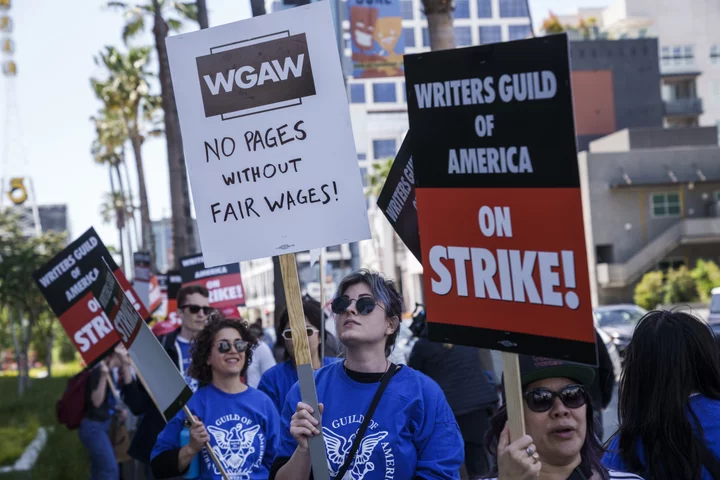Are you an avid television viewer? The champion of entertainment trivia on your pub quiz team? Love streaming and want to support the arts? Time to offer your voice, and resiliency funds, to Hollywood's picket lines.
As of July 14, the Screen Actors Guild – American Federation of Television and Radio Artists (SAG-AFTRA) is on strike, joining a two-month long picket movement started by the Writers Guild of America (WGA), the national organization representing television and film screenwriters across the U.S.
The Writers Guild of America (WGA) voted to call an industry strike on May 1, following six weeks of failed contract negotiations with the Alliance of Motion Picture and Television Producers (AMPTP). It's an updated version of the 100-day-long WGA strike that lasted from November 2007 to February 2008 — a call for fair pay which resulted in the shortening of many primetime TV shows, the stalling of movie productions, and a massive loss of staff, wages, and industry revenue.
SAG-AFTRA's demands for a fair contract with the AMPTP reached a similar halt, with unproductive negotiations on the use of AI and fair pay.
For two months, Hollywood writers and their supporters — including the celebrities heading some of network television's biggest hits — have continued a wave of on-the-ground picketing, with WGA members and strike organizers online encouraging supporters to help the entertainment workers beyond the strike, as well, by amplifying the call for fair deal and contributing to a financial safety net.
SEE ALSO: Twitter reacts to historic SAG-AFTRA/WGA strikeThe WGA currently represents 11,500 writers across the entertainment industry. SAG-AFTRA represents 160,000 actors, announcers, broadcast journalists, dancers, DJs, news writers, news editors, program hosts, puppeteers, recording artists, singers, stunt performers, voiceover artists, and other media professionals — including some content creators and otherwise impacting others.
Under strike rules, WGA members have ceased all work on current shows and won't go into negotiations on future projects. For some, that also means they've stopped getting paid, and others will also lose crucial benefits should the strike continue. While some showrunners and late night hosts pledged to continue paying writer wages out of pocket while the union strikes, it's not a widespread industry practice.
SAG-AFTRA members will navigate their own complex restrictions on work and pay — remember not all actors and media professionals are millionaire celebrities.
The effects of the strikes will reverberate far beyond the writers' rooms and movie sets. As productions halt, so too will the opportunities — and pay — for other industry workers, including cinematographers, hair and makeup teams, and even catering crews.
Rather than calling for an industry boycott, union members are asking for digital and in-person support and engagement. For those who can't lend a hand or lift a sign in person, members suggest donating to industry-wide resiliency funds instead — a form of mutual aid for the people that make Hollywood's glimmer possible, including those behind the scenes.
Credit: Michael M. Santiago / Getty ImagesShare your support, vocally or in-kind
SAG-AFTRA and WGA have asked supporters to continue sharing their demands and individual support online. Join the SAG-AFTRA movement by pledging your solidarity, or sign the WGA's letter of support for the guild's contract negotiation.
Supporters also can donate to food and practical support drives helping power the picket lines, or check out the strike toolkits — like the WGA Strike Social Media Toolkit and Social Toolkit for TV/Theatrical/Streaming — to learn how to effectively join the #WGAStrong, #WGAStrike, and #SAGAFTRAStrong causes.
Donate to the Entertainment Community Fund
The Entertainment Community Fund, formerly known as the Actors Fund, was founded in 1882 to support the needs of entertainment professionals at a time of social and charitable snubbing of the theater industry — many of these working artists and their families were denied charity due to their low standing.
In the 141 years since, the organization has expanded its services to provide an array of programs for anyone working in film, theater, television, music, opera, radio, and dance. The fund offers direct social services and financial assistance, housing support, health insurance and benefits counseling, and more.
Contribute what you can for film and television support programs
While guild members can access loans or grants through WGA West and WGA East strike funds, as well as the WGA West Good and Welfare Emergency Assistance Fund, donations to the Entertainment Community Fund broaden the availability of emergency financial assistance for other Hollywood employees and crew.
On the fund's donation portal, donors can designate their contributions specifically for programs offered to film and television professionals.
Credit: Entertainment Community FundVisit the guilds' strike pages to learn more and stay up to date on the WGA and SAG-AFTRA strikes.
Want to read more Social Good stories about activism? Sign up for Mashable's Top Stories newsletter today.









